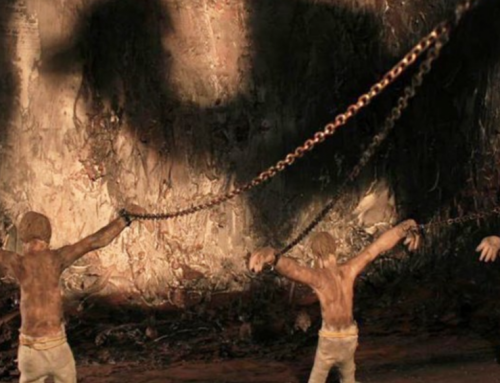the genetic battle between achievement and cooperation
Four things you might not know
- A shallow understanding of the genetic fundamentals of human behavior is perhaps the greatest deficit in leadership today.
- If you haven’t read half these books you’re not leadership material.
- CEO pay has grown 127 times faster than worker pay over last 30 years despite workers nearly doubling their productivity during the same time period that their compensation barely rose – and it’s a genetic disability.
- The growth in top pay has not taken place in isolation. It demonstrates the dominance of a particular form of capitalism … and an elevation of the concept of the rational self-interested man to unprecedented heights.
(11 minute read)
The folly of leadership

“The Evolution of Cooperation deserves to replace the Gideon Bible. I really do think that the planet would be a better place if everybody studied and understood it. The world’s leaders should all be locked up with this book and not released until they have read it. This would be a pleasure to them and might save the rest of us.” – Richard Dawkins, author of The Selfish Gene, Oxford, June 2006.
The Evolution of Cooperation by Robert Axelrod is a must-read for anyone who wants to be a true leader, not just in position and title, but in life. And there are several other books (see list below) if you’re interested in understanding why most leadership efforts – from CEOs to team leaders – have failed.
A shallow understanding of the fundamentals of human behavior is perhaps the greatest deficit in leadership today, compounded across an evolutionary timeline from organized tribalism and civilization to modern day organized governments and corporations. It follows that if leaders, and their entourage of advisors, don’t understand the problem, they can never come up with a solution, and if leaders don’t understand the behavior of the people they’re entrusted to lead, they can’t possibly lead.
The vast majority of leaders ignore the fundamental fact that we humans are the “Third Chimpanzee” (book by Jared Diamond) and that science over the past 3-4 decades has made a “great leap forward” in understanding human behavior through evolutionary psychology and sociobiology. Unfortunately, outside a small segment of the scientific community, few leaders seem interested in, as Richard Dawkins puts it, “saving us.” And the lack of knowledge in these disciplines in the C-suites, legislatures and leadership consultancy practices is self-evident in the continuing failure of leadership, at every level. We keep investing billions of dollars on superficial models that have little to do with an in depth understanding of the science of human nature. Or science at all.
Author of The Evolution of Cooperation, Dr. Robert Axelrod, is Professor of Political Science and Public Policy at the University of Michigan, and best known for his interdisciplinary work on the evolution of cooperation. As Richard Dawkins recommends in the above quote, every leader should read and understand Axelrod’s widely praised book. And there’s much more reading for those who have the intellectual curiosity and commitment to pursue a deeper wisdom in leadership.
There is a difference
 I mention below two examples of the different approaches to understanding human behavior. One represents the superficial and predominant approach deployed across business today, and the other is based on half-a-century of science. These two exemplify the divide between the dumpster of works that falsely claim a connection to “science,” and the small collection of works that actually present knowledge, theory and practice grounded in the scientific method. It is one thing to apply the label “science,” it’s yet another to do the rigorous work required to verify theory over time. Unfortunately, when it comes to leadership, there is too much of the former and not near enough of the latter.
I mention below two examples of the different approaches to understanding human behavior. One represents the superficial and predominant approach deployed across business today, and the other is based on half-a-century of science. These two exemplify the divide between the dumpster of works that falsely claim a connection to “science,” and the small collection of works that actually present knowledge, theory and practice grounded in the scientific method. It is one thing to apply the label “science,” it’s yet another to do the rigorous work required to verify theory over time. Unfortunately, when it comes to leadership, there is too much of the former and not near enough of the latter.
- The first example is captured in a recent short article distributed by the McKinsey Quarterly, Can organization design be science based? It’s one of thousands and comes from a group called Change Consulting, and is typical of the all-too-loose application of the science label in organizational design. I concur with one of the comments written below the article by Arthur Lerner that “computer based modeling” does not make something “science based.” Lerner also refers to the work of the late Dr. Elliott Jaques at the Requisite Organization Institute (RO). This is science. Lerner says (wrongly in my opinion), “I’m not advocating sifting to [through] RO methods and structure….” I disagree. Because Jaques’s work is my example of the longstanding application of science to organizational management.
- I highly recommend, to any leader, at any level, in any organization, to find the time to review Jaques’s more than half-century of work . It demonstrates a depth of tested and continuous science-based organizational development. The work of he and his colleagues can be seen at the Requisite Organization Institute. And Jaques seminal book, Requisite Organization is an excellent starting point.
There are tens-of-thousands of brief, pithy articles that cascade over the world of leadership, every week, and hundreds of well-meaning books proffering solutions and yet, despite this deluge, improvement in leadership over the past fifty years has seen little progress and continues to look more like the Adventures of Alice in Wonderland, just digging the rabbit hole deeper.
How can anyone expect to lead members of a species when they do not have a reasonable understanding of the roots of human behavior, particularly biology, genetics, anthropology and evolutionary psychology. Not too mention science in general. A prerequisite for a position of senior leadership should include an understanding of the works of Charles Darwin, E. O. Wilson, Claude Levi-Straus, Richard Dawkins, Elliott Jaques and Robert Axelrod, to name a few. As recommended by Charlie Munger of Berkshire Hathaway, leaders must find and understand the core principles from all disciplines – learn all the big ideas and how they interrelate – and incorporate them into what he calls, “elementary worldly wisdom,” embedded in a system of mental models.
A forty year conversation

Dr. Stan Blecher
I’ve written about this dearth of understanding among today’s so-called leaders numerous times. In fact, my last blog triggered a good response, including from an acquaintance, Dr. Stan Blecher, MD, Medical Geneticist, Professor Emeritus, Molecular Biology and Genetics, and Director Emeritus School of Human Biology, University of Guelph (see the last blog: Where is the leadership in this toxic brew of twisted populism, failing leadership and genetically driven Darwinian leaders?).
Dr. Blecher shared a paper with me that he wrote forty years ago, in 1977: “Genetic and Embryological Manipulation: An Historical Development and Its Contribution to the Human Dilemma.” Here’s a quote from the summary:
“From a biological viewpoint the central “value” of human society is survival of the species. Natural selection will favour an ethical system that ensures survival (“coexistence ethic”). Man’s survival will, however, depend on whether understanding and acceptance of this basic ethical law can develope in time to forestall the cataclysm to which the more destructive aspects of the urge for achievement are leading. Research that may advance the development of this understanding ought to receive high priority.” – Dr. Stan Blecher, 1977
That was forty years ago. Last week, Dr. Blecher sent me this brief comment:
“I argued that of the few instinctual traits that remain in humans, two dominate: the instinct to achieve, and the instinct to collaborate. The first expresses inter alia in the drive to dominate – this relates to what has later been identified by Dawkins as the selfish gene – and the second instinct expresses inter alia in altruism.
The first instinct also drives the function of learned behaviour, and the second expresses throughout evolution primarily in parental care of young and in pack-hunting. Both have been essential to human survival and evolutionary development, but they are in conflict with each other: Our drive for inventiveness is essential for survival but it leads to the constant need for societies to dominate their neighbours. But our ability to co-operate is also essential to survival.
I concluded my article by stating that the future of humankind will depend on which of the two instincts will win the conflict. If the first; we are doomed; our only hope is for us to learn to let the second instinct control the first.
I think this conclusion is close to the rhetorical question you pose near the end of your essay: “Will our selfish genes always overpower our altruistic ones?”
I haven’t had a chance to ask Dr. Blecher if he thinks much has changed in the last forty years to “forestall the cataclysm” as it relates to his statement that “research that may advance the development of this understanding ought to receive high priority.” But it seems fair to say that regardless of the significant advances in biological and evolutionary research, very few of these findings are being applied in the corporate world – and forget government, it’s still struggling to apply the democratic principles of Ancient Greece.
One stark number – which I often cite – underlines the failure of leaders to understand human behavior. It comes from Gallup research that finds 87% of employees, worldwide, are not engaged in their companies. In United States, it’s a nothing-to-brag-about 70%. That’s over 100 million Americans disengaged from their work. Canada is at 84%. That’s a human behavior problem of gargantuan proportions. And that’s a blatant failure of leadership (see earlier blog: 70% is a long way from 100% …).
“The critical question is not, ‘How can I achieve?’ but ‘What can I contribute?'” – Ten Traits of a Drucker-Like Leader.
Stop the insanity
The old, overused saw is worth using again as it applies to our human inadequacies in becoming great leaders: The definition of insanity is doing the same thing over and over and expecting a different result. In the forty year span since Dr. Blecher wrote his paper, we have proven we are incapable of winning the conflict between the two “instinctual traits” and leadership’s track record is an empirical endorsement of the “insanity” we keep doing over and over again. It’s time to look in the biological mirror.
This cycle of failure is in spite of CEO’s bookshelves being chock-full of non-science-based tomes from Tom Peter’s recanted Search for Excellence and James Champy’s, fall-flat-on-its-face Reengineering to Jim Collin’s unsustainable Good To Great. An exception is Philip Kirby’s Process Mind, which is designed around an understanding of the instinct to cooperate but it only works if the CEO “gets it” (many don’t). These efforts offer practical improvements but none delve into a sustainable approach for understanding human behavior, from the top down. How can anyone, build anything of lasting value if it is not anchored in a full understanding of “the instinct to collaborate” (altruism, cooperation) and how that, in turn, is dominated by “the instinct to achieve” (individualism, selfishness)? They can’t. And the evidence is strewn across the history of leadership.
The growth in top pay has not taken place in isolation. It demonstrates the dominance of a particular form of capitalism … and an elevation of the concept of the rational self-interested man to unprecedented heights. In this environment human nature, aspiration and endeavour are seen through a prism of self interest, or as some would put it “greed” as ever larger rewards are required to generate performance from individuals at the top of companies whose predecessors but a generation ago did the job for a tenth of the pay. Yet top pay is not only a symptom of a particular form of capitalism but is also contributing to many of the problems we see in our economy, society and companies. – High Pay Commission, UK.
What the hell have leaders been doing for the last 40 years?
It’s clear that the genetic “instinct to achieve,” as proffered by Dr. Blecher in 1977, has continued to dominate, unabated, and it also suggests that Dr. Axelrod’s book on the genetics of cooperation, first published in 1984, is one of the least read books by leaders. Obviously, few in leadership seem prepared to try and understand this bigger issue?
Empirical insanity

- CEO pay has grown 127 times faster than worker pay over last 30 years.
- In 1965, CEOs of America’s largest corporations were paid, on average, 20 times the average workers. Now, the ratio is over 300 to 1.
- The average annual earnings of the top 1 percent of wage earners grew 156 percent from 1979 to 2007.
- This disparity is despite workers nearly doubling their productivity during the same time period, when compensation barely rose. Worker productivity spiked 93 percent between 1978 and 2011 on a per-hour basis, and 85 percent on a per-person basis.
- Only 7 percent of companies believe they are “excellent” at building Millennial leaders.[1] And yet, by 2025 they will be 75% of workforce.[2]
Current advise from some of the world’s leading consultancies doesn’t help much either. They keep saying what they’ve been saying for decades, each time making it sound like a revelation rather than a recycling of genetically-blocked thinking. Here are a few excerpts from Deloitte’s much heralded annual trends reports (Deloitte is just one example of the ongoing regurgitation of rethinking):
- Deloitte, Global Human Capital Trends 2016: “After three years of struggling to drive employee engagement and retention, improve leadership, and build a meaningful culture, executives see a need to redesign the organization itself, with 92 percent of survey participants rating this as a critical priority. The “new organization” as we call it, is built around highly empowered teams, driven by a new model of management, and led by a breed of younger, more globally diverse leaders. To lead this shift toward the new organization, CEOs and HR leaders are focused on understanding and creating a shared culture, designing a work environment that engages people, and constructing a new model of leadership and career development.”[3] [Question: So what’s new? Oh, “a new model” built on the same old needs that have gone unresolved for decades – “shared cultures and engaged people.” According to Deloitte, leaders spent $13.6 billion on leadership development in 2012 and now they say leaders need “a new model.” Yikes! Read the books listed below before you spend anymore].
- Deloitte, Global Human Capital Trends 2016: “Collaboration, too, is becoming [my italics] a critical leadership skill: With organizations continuing to evolve rapidly beyond vertically integrated enterprises to networks and ecosystems, groups of leaders are being forced to work together in new ways, including collaboration across generations, geographies, functions, and internal and external teams.” [4] [Question: The Evolution of Cooperation was written in 1984, revised 2006, and in 2016 Deloitte is just getting around to suggesting that “Collaboration, too, is becoming a critical leadership skill”].
- 2017 Deloitte Global Human Capital Trends: “Executives identified building the organization of the future as the most important challenge for 2017. In this year’s survey, nearly 60 percent of respondents rated this problem as very important, and 90 percent rated it as important or very important. This level of interest signals a shift from designing the new organization to actively building organizational ecosystems and networks.”[5] [Question: Just what the hell does that mean? And if you’re going to “build organizational ecosystems and networks” – with, for and by humans – you might want it grounded in the genetic and cultural fundamentals of human behavior].
Deloitte states, as some kind of slogan: “Human potential practices, policies, and programs are designed to reflect our best understanding of human behavior.” So I ask, what’s been on their reading list the last decade? Because their “best understanding” seems to becoming up woefully short. Have they not read and applied much of the understanding from the books listed below?
“Maximizing shareholder value or making a profit are not unimportant. But they should be the consequence of making a meaningful contribution to the world.” – Peter Drucker.
It’s the right question
Dr. Blecher asked the right question forty years ago: How can we “learn to let the second instinct control the first?” Today, the question is: Why are leaders so unsuccessful in answering that, in learning how to develop, foster and sustain the altruistic second instinct so that it overrides the selfish instinct?
Recent history has shown that as of yet, we have not evolved and the first instinct continues to run roughshod over the second. Perhaps worse, outside the scientific community, there are few signs that we are making a serious application of science to understand the extent of the problem – with a few exceptions, like Jacques’s Requisite Organization. The Requisite Organization provides a design, structure and application that is fundamental to the altruistic instinct, requiring cooperation and collaboration from top to bottom.
Why do so-called leaders not have the interest, will and courage to try and understand the most basic elements of the human condition? Perhaps because it would require them to give up too much. Or is it inevitable that humans, once in positions of power and authority, cannot genetically override their selfish instinct to achieve? At times, they are altruistic and cooperative but usually when it does not undermine their selfish instinct. Perhaps, as a group, as a species, we will never truly learn to lead and are on an endangered list, destined for cataclysm.
In the meantime, the least we can hope for is that more than a handful of leaders expand their reading list in order to expand their understanding so that they might expand their capacity to lead, and, as Richard Dawkins said, “save the rest of us.”
An easier question: Ask the boss
There is a low probability that your leader (i.e., CEO, HR head, high-priced consultant, supervisor) has read much on evolutionary cooperation and the power of our genetic instincts and it’s highly unlikely there are any worthwhile discussions about it in the corporate dining rooms or around the water cooler. But maybe there’s a chance your boss would be interested. So I leave you with the task of finding out what’s on your leader’s or consultant’s or politician’s reading list. Find out if he or she has read any of the following:
- The Evolution of Cooperation by Robert Axelrod
- On Human Nature by Edward O. Wilson
- The Social Conquest of Earth by Edward O. Wilson
- The Selfish Gene by Richard Dawkins
- The Descent of Man by Charles Darwin
- Anthropology Confronts the Problems of the Modern World by Claude Lévi-Strauss
- Requisite Organization by Elliott Jaques
- Human Capability by Elliott Jaques and Kathryn Cason
- Behave: The Biology of Humans at Our Best and Worst by Robert Sapolsky
- Sapiens: A Brief History of Humankind by Yuval Noah Harari
Litmus test
I made the list ten because we are inclined to score things on scales of one-to-ten. So score how many of the books on the list the boss – or you, if you’re a leader – has read? There are numerous others not listed that would qualify so you can add them as”wildcards” if they’ve been read (e.g., An Enquiry Concerning Human Understanding by David Hume, Thinking Fast, and Slow by Daniel Kahneman).
- Read 0: Non-leadership material (lack intellectual curiosity).
- Read 1: A neophyte interested in leadership.
- Read 2-3: Potential but need to expand intellectual understanding.
- Read 4-5: Good foundation for intellectual pursuit.
- Read 6-7: Building a capacity for excellence in human leadership.
- Read 8-10: Has the basis and capacity to become an extraordinary leader or advisor to leaders. You’re in Charlie Munger’s class of “elementary worldly wisdom.”
If you’re the boss, scoring is easy. If you’re not, try sprinkling questions about these books into conversations with the boss to determine if he or she has read or heard of the book (keep in mind, they could be a great gift to give the boss).
Footnotes:
- Deloitte, Global Human Capital Trends 2016, p. 5
- Deloitte Global Human Capital Trends, 2014, p. 3
- Deloitte, Global Human Capital Trends 2016, Introduction, p.1
- Ibid
- 2017 Deloitte Global Human Capital Trends. p. 5.







Hello David,
A very profound and enjoyable article. There are many ideas that resonate strongly with my beliefs. Your insightful assessment of failed leadership, repackaged ideas with clever names and tag lines is spot on. It makes the primary moral/ethical code of the leadership profession, “Above all do no harm” (Ducker Institute) while very hard to do in practice almost laughable in a leadership marketplace where posers, con artists and egocentric (and superficial) experts thrive with their microwave approaches and cleverness. The customers are the (many times willing) victims seduced by our predispositions, as humans, to a set of irrational beliefs that we devoutly defend. Or, perhaps maybe we are more Theory X mindedness than we admit. Self-defeating beliefs that cognitive behavioral science has shown causes us often to work (unconsciously perhaps) to defeat our own goals. Your article goes deep into the hard sciences that teach us so much about our fallible nature genetically constructed. The drives and instincts you reference that operate as competing agendas are powerful determinates as are your conclusions regarding the lack of real leadership education and more importantly self-awareness within the established leadership profession.
In my experience, there is a great void in the interiors of leaders (most people). Things like self-interest, ego, narcissism, power, greed and a lack of depth from an evolutionary psychology perspective are easily supported by human defense mechanisms like denial, projection, self-deception, etc. Preparing the stew we recognize as the primary diet of mainstream leadership and the typical good life, so called. Your Deloitte piece was classic and it’s a large family. Regardless, we can’t seem to get enough as you point out so convincingly. Believing that insight is generally meaningless to most humans may be at the core but I’m sure it goes much deeper. Maybe we are predisposed to laziness as a big part of the human condition when you consider that we are typically a low expectation (high fantasy), ordinary, good enough majority in terms of what constitutes the meaning of our one life.
If I were to add to your story line, I would say by definition (mine anyway) that scientific materialism is by nature reductionistic. So while I don’t quarrel with many of your scientific assertions and conclusions, they seem at best thorough scientific perspectives and at worst partial perspectives of the complexity of being human and being in the world. I have no disagreement that the books you recommend offer a better map for leaders than most of the superficial offerings that fill the leader’s shelves and elevate many of the authors to celebrity status much to the trickster ego’s delight. That said, in my experience, it may be a leap of faith to think that many would be leaders would find these books (and similar works with depth) much less read, retain and be changed by them.
No, unfortunately, the rigors of the scientific method hold little hope for leadership transformation beyond poser emulation and short term fashionable interests. The true believers will take up the practice of the (leadership) profession in much the same as a would-be scientist becomes an outstanding one by committing to do the hard work and continuous improvement practices for a lifetime or two. Since in todays (and past lives) arena, words like leadership and many other important constructs have been dumped down to mean everything and nothing, only the determined and committed (genetically so or otherwise) few will seek out the maps with depth and empirical findings behind them. The misguided, misinformed and anything for a buck crowd will continue to prosper at the expense of the many. My opinions and I could be wrong. Great stuff, my man. A rare and deep dive into the swamp. Highly thought provoking and enjoyable. Thank you very much for the article.
Doug
@Doug:
Well said! An excellent continuation of a conversation that needs to extend into the hallowed halls of C-suites. But, as you suggest, if the past is prologue it’s not likely to happen any time soon. Your point that many of my assertions are “partial perspectives of the complexity of being human …” is absolutely correct. We humans are extremely complex and we are only beginning to gain a scientific understanding of the species and we must never claim to have much of anything figured out. We need to begin in humility. My point is that we are only at the beginning of understanding – thanks to science – any yet, we ignore the science and continue to adhere to, as you say, “our predispositions … to a set of irrational beliefs that we devoutly defend.” Before we can hope to advance, we must stop the insanity of regurgitating practices served up by, what you so rightly call, “superficial experts with their microwave approaches and cleverness” – 90% of the consulting practices (e.g., Deloitte, et al). Your experience reaffirms the “leap of faith to think that many would be leaders would find these books” of interest. But alas, we have to somehow expand the current small base of thought-leaders in corporate life and this reading list might be a catalyst to a few taking on the pursuit of greater understanding and wisdom. If Charlie Munger and Warren Buffett believe in it, there is a chance that some will emulate there example. We can hope. In the meantime, our task is to widen the conversation, reading, interest and practice. Thanks for sharing!